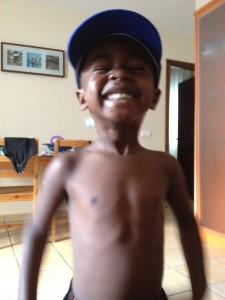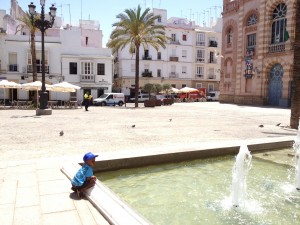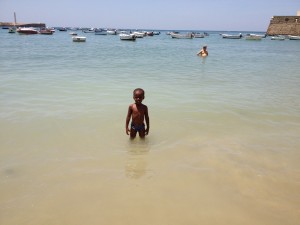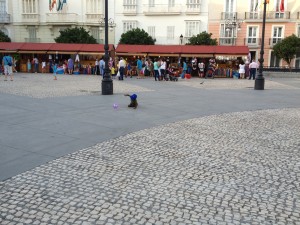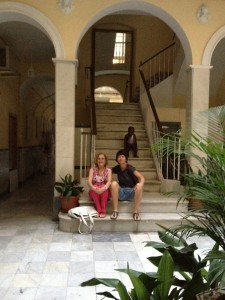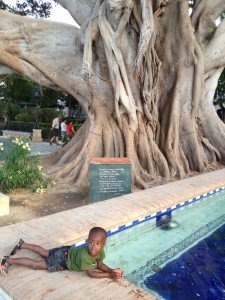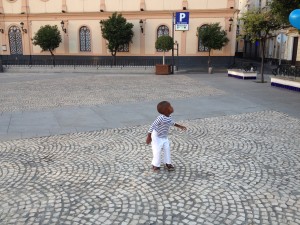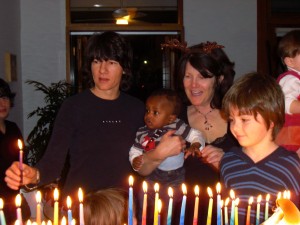Today’s the 4th of July and on the corner the students of flamenco are preparing for their festival tomorrow night – their stomping sounds like firecrackers popping off. Tin and I are invited to come watch and perhaps I will take lessons from her afterwards. Now Tatjana and her students are having a barbecue at the residencia and I’m left here to have an evening to myself as tomorrow is an all day excursion to Jerez de la Frontera with the students – so there will be no break in the action for a 3 year old and his mother who are staying behind.
Tatjana’s lesson tomorrow is Neruda – a poem about the civil war in Spain, a poem Neruda wrote after his friend, the Spanish poet Federico García Lorca was murdered by Franco’s fascists and then made to dig his own grave. Such a haunting poem, and so appropriate on today, Independence Day.
This morning, I was reading about the Buddhist version of femininity and masculinity – the feminine is being, the masculine is doing – and both are embodied in each of us – unlike the Western version of the smothering femininity that the separate masculinity seeks to escape. The West sees incompatibility and the East reconciliation. Meanwhile, Tatjana was preparing for her class – reading about anima and animus – the feminine and masculine of Jungian archetypes that is how the woman accommodates the man and vice versa. Again extremes – genders trying to accommodate the other rather than embracing the other within.
Celebrations of revolutions are extremes – because you only celebrate in peace time what was once war time. The blood, the strife, the horror – now barbecue, flags, and fireworks.
Neruda’s poem – so appropriate for our fourth of July celebration:
Explico Algunas Cosas
(I’m Explaining a Few Things)
por (by) Pablo Neruda
Preguntaréis: Y dónde están las lilas?
Y la metafísica cubierta de amapolas?
Y la lluvia que a menudo golpeaba
sus palabras llenándolas
de agujeros y pájaros?
Os voy a contar todo lo que me pasa.
Yo vivía en un barrio
de Madrid, con campanas,
con relojes, con árboles.
Desde allí se veía
el rostro seco de Castilla
como un océano de cuero.
Mi casa era llamada
la casa de las flores, porque por todas partes
estallaban geranios: era
una bella casa
con perros y chiquillos.
Raúl, te acuerdas?
Te acuerdas, Rafael?
Federico, te acuerdas
debajo de la tierra,
te acuerdas de mi casa con balcones en donde
la luz de junio ahogaba flores en tu boca?
Hermano, hermano!
Todo
eran grandes voces, sal de mercaderías,
aglomeraciones de pan palpitante,
mercados de mi barrio de Argüelles con su estatua
como un tintero pálido entre las merluzas:
el aceite llegaba a las cucharas,
un profundo latido
de pies y manos llenaba las calles,
metros, litros, esencia
aguda de la vida,
pescados hacinados,
contextura de techos con sol frío en el cual
la flecha se fatiga,
delirante marfil fino de las patatas,
tomates repetidos hasta el mar.
Y una mañana todo estaba ardiendo
y una mañana las hogueras
salían de la tierra
devorando seres,
y desde entonces fuego,
pólvora desde entonces,
y desde entonces sangre.
Bandidos con aviones y con moros,
bandidos con sortijas y duquesas,
bandidos con frailes negros bendiciendo
venían por el cielo a matar niños,
y por las calles la sangre de los niños
corría simplemente, como sangre de niños.
Chacales que el chacal rechazaría,
piedras que el cardo seco mordería escupiendo,
víboras que las víboras odiaran!
Frente a vosotros he visto la sangre
de España levantarse
para ahogaros en una sola ola
de orgullo y de cuchillos!
Generales
traidores:
mirad mi casa muerta,
mirad España rota:
pero de cada casa muerta sale metal ardiendo
en vez de flores,
pero de cada hueco de España
sale España,
pero de cada niño muerto sale un fusil con ojos,
pero de cada crimen nacen balas
que os hallarán un día el sitio
del corazón.
Preguntaréis por qué su poesía
no nos habla del sueño, de las hojas,
de los grandes volcanes de su país natal?
Venid a ver la sangre por las calles,
venid a ver
la sangre por las calles,
venid a ver la sangre
por las calles!
TRANSLATION:
You are going to ask: and where are the lilacs?
and the poppy-petalled metaphysics?
and the rain repeatedly spattering
its words and drilling them full
of apertures and birds?
I’ll tell you all the news.
I lived in a suburb,
a suburb of Madrid, with bells,
and clocks, and trees.
From there you could look out
over Castille’s dry face:
a leather ocean.
My house was called
the house of flowers, because in every cranny
geraniums burst: it was
a good-looking house
with its dogs and children.
Remember, Raul?
Eh, Rafel?
Federico, do you remember
from under the ground
my balconies on which
the light of June drowned flowers in your mouth?
Brother, my brother!
Everything
loud with big voices, the salt of merchandises,
pile-ups of palpitating bread,
the stalls of my suburb of Arguelles with its statue
like a drained inkwell in a swirl of hake:
oil flowed into spoons,
a deep baying
of feet and hands swelled in the streets,
metres, litres, the sharp
measure of life,
stacked-up fish,
the texture of roofs with a cold sun in which
the weather vane falters,
the fine, frenzied ivory of potatoes,
wave on wave of tomatoes rolling down the sea.
And one morning all that was burning,
one morning the bonfires
leapt out of the earth
devouring human beings —
and from then on fire,
gunpowder from then on,
and from then on blood.
Bandits with planes and Moors,
bandits with finger-rings and duchesses,
bandits with black friars spattering blessings
came through the sky to kill children
and the blood of children ran through the streets
without fuss, like children’s blood.
Jackals that the jackals would despise,
stones that the dry thistle would bite on and spit out,
vipers that the vipers would abominate!
Face to face with you I have seen the blood
of Spain tower like a tide
to drown you in one wave
of pride and knives!
Treacherous
generals:
see my dead house,
look at broken Spain:
from every house burning metal flows
instead of flowers,
from every socket of Spain
Spain emerges
and from every dead child a rifle with eyes,
and from every crime bullets are born
which will one day find
the bull’s eye of your hearts.
And you’ll ask: why doesn’t his poetry
speak of dreams and leaves
and the great volcanoes of his native land?
Come and see the blood in the streets,
come and see
the blood in the streets,
come and see the blood
in the streets!
Pablo Neruda [1904-1973], whose real name is Neftalí Ricardo Reyes Basoalto, was awarded the Nobel Prize for Literature in 1971. He wrote this poem in 1936 in Spain where he was a Chilean consul, shortly after the murder of his friend, the Spanish poet Federico García Lorca, by Franco’s fascists — known as the Nationalists (they actually forced García Lorca to dig his own grave). Neruda died on September 23, 1973, about two weeks after the “suicide” of Chile’s democratically-elected president, Dr. Salvador Allende, when Pinochet’s fascist thugs, with the covert assistance of the US CIA, overthrew the legitimate Chilean government and brought about a dictatorial regime based on terror and torture. Like Franco, Pinochet was a “nationalist” and a close friend of the US government. Neruda, like García Lorca, was considered a ‘subversive.’ Who do you think History will celebrate, Pinochet or Neruda (horror or beauty)? According to Joan Jara (the wife of Chilean folk singer Victor Jara who was tortured, his hands broken (he played the guitar), and eventually killed by the military at the Estadio de Chile), “As we walked through the back streets towards the cemetery, I heard Neruda’s poetry being recited by one person after another in the crowd, verse after verse, defying the menace of the uniforms surrounding us; I saw the workers on a building site, standing to attention with their yellow helmets in their hands… Neruda’s verses took on an even greater significance as voice after voice took them up, confronting the visible face of fascism.” Dr. Salvador Allende, man of honor, justice, compassion — a people’s man — and Pablo Neruda, a poet who epitomized life and people, did not die in vain. Neither did Victor Jara and countless others. We remember!
